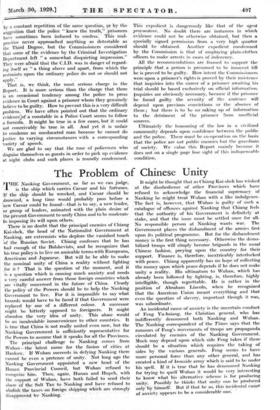The Problem of Chinese Unity
THE Nanking Government, so far as we can judge, is the ship which carries Caesar and his fortunes. If the ship should be wrecked, and Caesar should be drowned, a long time would probably psi before a new Caesar could be found—that is to say, a new leader, Or group of leaders, animated with the plain desire of the present Government to unify China and to be moderate in imposing its will upon others.
There is "no doubt that the principal enemies of Chiang Kai-shek, the head of the Nationalist Government at Nanking, are extremists who deplore the vanished touch 'of the Russian Soviet. Chiang confesses that he has 'had enough of the BOIshevists, and he recognizes that his true policy is to live on amicable terms with Europeans, 'Americans and Japanese. But will he be able to make the nominal unity of China 'a reality without fighting for it ? That is the question of the moment, and it is a question' which is causing much anxiety and needs a very careful answer from those foreign countries which 'are -vitally -concerned in the future of China. Clearly the policy of the Powers should be to help the Nanking Government to live. For it is impossible to say what hazards would have to be faced if that Government were replaced by one of a different colour. A successor might be -bitterly opposed to foreigners. It might abandon the very idea of unity. This alone would be an incalculable inconvenience to other countries. It is tine that China is not really united even now, but the Nanking Government is sufficiently representative for the Powers to assume that it speaks for all the Provinces.
The principal challenge to Nanking comes from Wuhan—the latest name for the fusion of cities at Hankow. If Wuhan succeeds in defying Nanking there cannot be 'even a pretence of unity. Not long ago the Nanking Government appointed a new' head of the Hunan Provincial Council, but Wuhan refused to 'recognize him. Then, again, Hunan and Hupeh, with the support of Wuhan, have both failed to send their share 'Of the Salt Tax to Nanking and have refused to abolish the taxes on foreign shipping which are strongly 'disapproved by Nanking. ' It might be thought that as Chiang Kai-shek has winked at the disobedience of other Provinces which have refused to acknowledge the financial supremacy of Nanking he might treat Wuhan with a like indulgence. The fact is, however, that Wuhan is guilty of such a catalogue of offences against Nanking that Chiang feels that the authority of his Government is definitely at stake, and that the issue must be settled once for all. No responsible person at Nanking wants war. The Government places the disbandment of the armies first upon its political programme. But for the disbandment money is the first thing necessary. Otherwise the demo- bilized troops will simply become brigands in the usual Chinese fashion, preying upon the country for their support. Finance is, therefore, inextricably interlocked with peace. Chiang apparently has no hope of collecting the money upon which peace depends if he does not make unity a reality. His ultimatum to Wuhan, which has already been followed by fighting, is, therefore, highly intelligible, 'though regrettable. He is rather in the position of Abraham Lincoln, when he recognized that the American Union meant everything and that even the question of slavery, important though it was, was subordinate.
An incidental cause of anxiety is the uncertain conduct of Feng Yu-hsiang, the Christian general, who has indifferently denounced both Nanking and Wuhan. The Nanking correspondent of the Times says that the rumours of Feng's movements of troops are propaganda circulated by enemies of the Nanking Government. Much may depend' upon which side Feng takes if there should be a situation which requires the taking of sides by the various generals. Feng seems to have more' personal force than any other general, and has created a kind of Ironside army which is said to be under his spell. If it is true that he has denounced Nanking for trying to quell Wuhan it would be very interesting to know what his alternative Scheme is for producing unity. Possibly he thinks that unity can be produced only by himself. But if that be so, this incidental cause of anxiety appears to be a considerable one.


















































 Previous page
Previous page